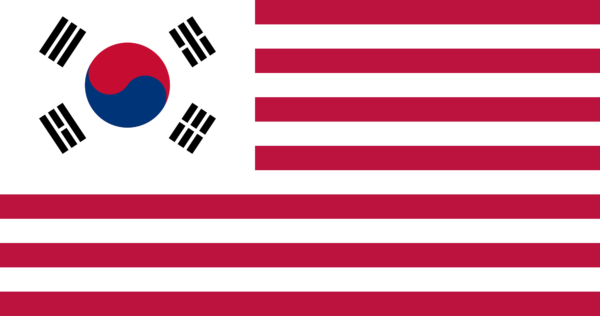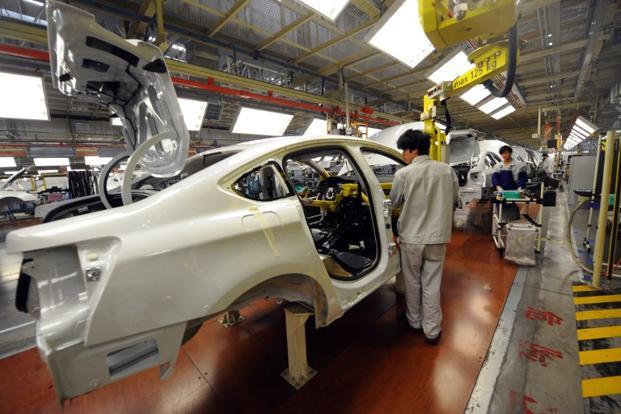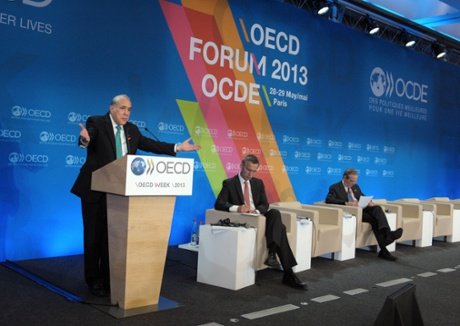Home Tags Posts tagged with "oecd"
oecd
Relations between the United States and South Korea had their beginnings at the end of World War ll in 1945 when the US occupied the south end of the peninsula and the Soviet Union took the north end pending planned national elections. The two sides could not agree on the type of government (Washington was for a democracy and Moscow favored communism;) hence, an election never took place, resulting in the United Nations recognizing South Korea (Republic of Korea) as the legitimate government.
In 1950, North Korea invaded the ROK and the US sent its military to South Korea to help them fight against the communist invasion. By 1953, the war ended in a stalemate, but the US troops remained, and in 1954, both countries signed the ROK/US Mutual Security Agreement, a pact to defend each other in case of foreign attacks. In reality, this was more of a one-sided agreement. South Korea feared another invasion from North Korea and the presence of the US military hindered such plans.
Post-Korean War, the ROK was ravaged. Its per capita GDP plunged to $64, lower than the African nation of Congo, which was then the poorest. Millions of people were injured, killed and separated from their families. The United States was its single biggest contributor, giving its Asian ally a total of $64 billion in grants, aids, and loans from 1948 to 1978. Its economy grew rapidly in the 1960s and today, it is the fourth biggest economy in Asia, and is a member of the OECD and the G20.

Image source Wikimedia
The ties that bind Seoul and Washington have remained strong. Trade between the two countries reached an estimated $144.6 billion in 2016, and Korea is the US’ sixth biggest goods trading partner. Seoul has the second largest contingent of US military personnel, numbering around 23,500 troops.
But 2017 brought in new leaders for the two nations. President Trump took office in January and President Moon Jae-in in May, and one is as different from the other as night is from day. Trump has shown himself to be a racist, misogynist, and favoring isolationism. Moon is a former student activist and human rights lawyer.
Already, some issues are possible areas of contention. While Trump is aggressively hostile against North Korea and threatens to attack it, Moon, a champion of human and civil rights, prefers the soft approach by engaging in talks to reach an agreement.
On the US’ bilateral trade agreement, Trump wants a renegotiation of the KORUS Free Trade Agreement to reduce US’ trade deficit. He has been quoted as saying that the US is losing $40 billion a year on ROK in trade. The White House Chief Executive has also demanded cost sharing on defense spending with Asian allies and talks on the Special Measures Agreement have begun. During his campaign period, Trump was quite vocal in his criticism of the nation’s expenses for the US troops stationed in allied countries.
South Korea’s show of independence from its benefactor was evident in the High Court’s ruling on the lawsuit that former comfort women brought against the ROK government. The women, now in their 70s, claim that they were forced into prostitution for the US military with the tacit consent of their officials. They won their case and Seoul’s court has ordered the government to pay them damages. While the United States was not a party to the suit, and embassy officials would not comment on it, this is the first official acknowledgment that American soldiers are not as faultless as they are portrayed to be.
What hasn’t changed is its arrogance towards Japan. Japan has taken to heart its war crimes and the atrocities its army has committed against the comfort women of World War ll. It has given billions in aid and compensation and offered numerous apologies to the women. But South Korea’s leaders, past and present, never stop asking for more.
The recent case involving their own government selling their own women to US soldiers should make them realize that they should clean up their own backyard instead of throwing garbage on to other countries.
The Organization for Economic Co-operation and Development (OECD) has cut global growth forecasts for 2013 and 2014 after weak prospects in emerging markets.
Global GDP for 2013 is now expected to grow by 2.7%, down from 3.1% forecast in May.
However, the OECD said global economic growth would speed up by 2015.
The OECD also revised down its global growth forecast for 2014, which it now estimates at 3.6%. In May, it had forecast 4%.
In a first estimate for 2015, it predicts growth of 3.9%.
The OECD said “weakness” in the banking system was a “major drag” on growth in the euro area.

OECD has cut global growth forecasts for 2013 and 2014 after weak prospects in emerging markets
The “potentially catastrophic crisis” over the debt ceiling in the US and “strong” market reaction to its suggestion of tapering had also unsettled confidence, it said.
OECD chief economist Pier Carlo Padoan said: “Brinkmanship over fiscal policy in the United States remains a key risk and uncertainty.”
Carlo Padoan said hitting the debt ceiling could “knock the US and the global recovery off course”.
He called for monetary policy in the US to “remain accommodative for some time”.
The global economy would act as an “amplifier” for negative shocks from a “stronger slowdown” in emerging markets, Carlo Padoan said.
He cited population trends in emerging economies, and the narrowing gap with advanced economies, as behind the “fragility”.
“Downside risks dominate and policy must address them,” he said.
Carlo Padoan said high levels of public debt in Japan created risks, but commended its export growth, rising consumer spending and rebound in business investment.
He warned governments about the risks of complacency as recovery gained momentum.
“Policy inaction or mistakes could have much more severe consequences than the turbulence seen to date and jeopardize growth for years to come.”
[youtube MDHIIOdHkxE 650]
The OECD has revised its growth forecasts for the eurozone and called on the European Central Bank to consider doing more to boost growth.
The organization says the eurozone will shrink by 0.6% this year, widening the gap between it and faster-growing economies such as the US and Japan.
Meanwhile, the European Commission has given France two more years to complete its austerity programme.
France fell back into recession in the first three months of the year.
Spain, Poland, Portugal, the Netherlands and Slovenia have also been given more time to complete fiscal tightening.
The move suggests a shift away from a focus on austerity in Europe.
In its twice-yearly Economic Outlook, the OECD said prolonged economic weakness in Europe could damage the global economy.
The OECD, which represents 34 advanced economies, forecast average growth across its members of 1.2% this year and 2.3% in 2014.
It painted a troubled picture of the eurozone economy. The forecast of a 0.6% contraction in GDP is down markedly from the 0.1% contraction forecast just six months ago.
It said eurozone unemployment would continue to rise from its current rate of 12%, stabilizing in 2014.

The OECD has revised its growth forecasts for the eurozone and called on the European Central Bank to consider doing more to boost growth
It blamed continuing austerity measures, weak confidence and tight credit conditions. It hinted that the European Central Bank (ECB) might want to expand quantitative easing (QE) as a measure to encourage stronger growth.
It warned the continuing weakness in Europe “could evolve into stagnation, with negative implications for the global economy”.
The US and Japan have seen a greater focus on stimulus measures compared with Europe, where austerity measures have taken precedence.
Japan is forecast to grow relatively strongly this year, adding 1.6% to its GDP on the back of extraordinary economic stimulus measures introduced by the government this year.
But the OECD said there was considerable uncertainty over whether that recovery would continue into 2014, when the government is expected to cut spending.
In the US, where growth of nearly 2% is forecast for this year, the OECD said quantitative easing measures might need to be “gradually reduced”.
China is not included in the OECD club, but the organization expects its annual growth to be about 8% over the next two years.
The OECD’s chief economist, Pier Paolo Padoan, told Reuters that the eurozone remained the dominant area of concern.
“Europe is in a dire situation,” he told the news agency.
“We think that the eurozone could consider more aggressive options. We could call it a eurozone-style QE.”
[youtube lo8eiZBe7rg]



